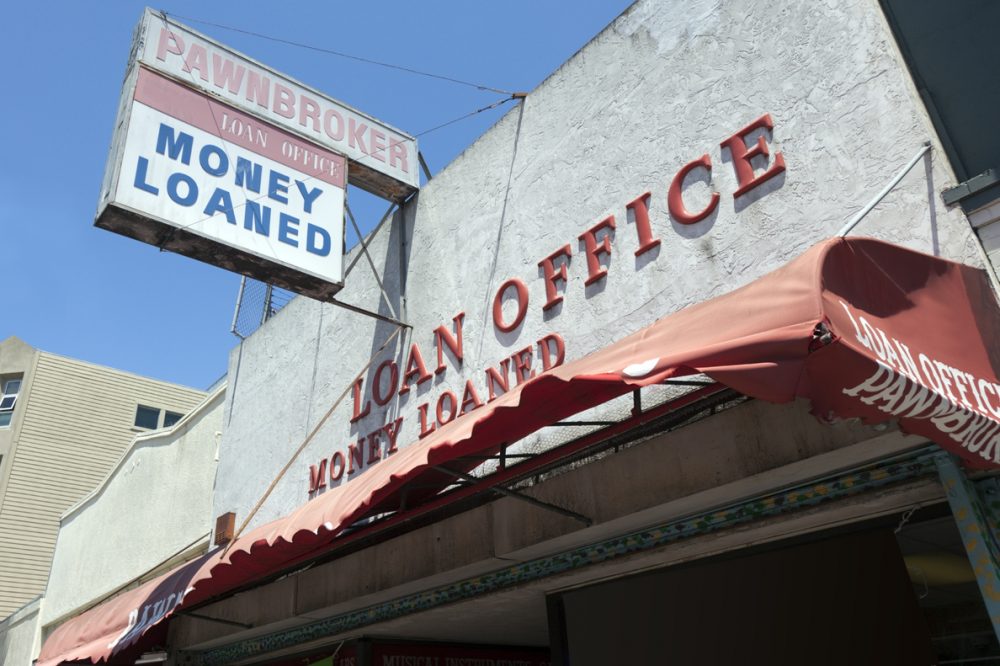Financial Retronovation #2: Resurrecting the check register…with an AI assist
Imagine going to your smart phone to view your checking balance and seeing two numbers instead of one. The first number is the traditional available balance. The second is an estimate –more often than not, a smaller number — that projects what your balance will be one, two or three days from now.
Redesigning the Financial Roadmap for the LMI 50+ Segment
Using data from the U.S. Financial Health Pulse, the Financial Health Network identifies five challenges for the LMI 50+ and opportunities for providers to support this fast-growing segment.
Webinar: Key Findings from the Pulse & What They Mean for Your Business
During this member-exclusive webinar, authors of the U.S. Financial Health Pulse 2018 Baseline Survey explored findings from this groundbreaking research initiative. The first in a three-part series, this conversation explored into new cuts of the data and shared findings and trends on how Americans are saving and borrowing.
Comment Letter: Small-Dollar Lending
The Center for Financial Services Innovation responds to the FDIC’s Request for Information on Small-Dollar Lending based on our research into the consumer behaviors, products, and providers that comprise the market for small-dollar credit.
2018 Financial Health Leaders Spotlight: BECU
Listen in as we hear BECU discuss their financial health measurement strategy for both customers and employees and what they are learning after building a financial health model.
Comment Letter: Reforming the Community Reinvestment Act Regulatory Framework
The Center for Financial Services Innovation submitted these comments to the Office of the Comptroller of the Currency in response to the Advance Notice of Proposed Rulemaking.
Auto Insurance Spotlight
This brief takes a closer look at the auto insurance coverage, acquisition channels, knowledge, and claims experience of American consumers, with a particular focus on LMI consumers.
Disability Insurance Spotlight
To show how disability insurance can augment financial resilience, this brief examines short- and long-term disability insurance coverage, acquisition channels, and knowledge of American consumers, with a focus on LMI consumers.
Insurtech for Financial Health
Explore three major insurtech advances that could help more Americans weather financial shocks successfully, as well as potential pitfalls for insurers working to align business incentives with customer needs.
2018 Financial Health Leaders Spotlight: FinFit
Listen in as we hear FinFit share how they think about the business case for financial health for employers and the impact they are seeing from the new FinFit IQ trivia game.
Member Summit 2018 Speakers
Member Summit 2018 was October 4-5, 2018 in Chicago, IL.
FinHealth Score® Toolkit
Explore the Toolkit now to start measuring and improving your customers’ financial health.
2018 Financial Health Leaders Spotlight: Cinch Financial
Listen in as we hear how Cinch Financial is using qualitative and quantitative approaches to deliver true financial health at scale to all households through both direct and advisor-oriented channels.
2018 Financial Health Leaders Spotlight: Servus Credit Union
Listen in as we hear how Servus Credit Union is working to embed its noble purpose of shaping member financial fitness into all areas of the credit union by using a series of purpose-driven outcomes for both the credit union and its members.
Measuring Customer Attitudes and Behaviors Through Surveys
Learn how EVERFI is measuring customer attitudes and behaviors through surveys based on the Financial Health Network’s financial health framework and what they plan to do with that data.
Redefining Student Success: Community Colleges and the Financial Health Journey
Actively supporting student financial health is a mission-critical investment for community colleges. This report provides a roadmap to help community colleges navigate that journey.
2018 Financial Health Leaders Spotlight: Safety Net, LLC
Listen in as we hear how Safety Net, LLC, a startup company fully owned by CUNA Mutual is using the CFSI Financial Health Score™ Toolkit, and the key takeaways the team is starting to learn.
Dispatch from D.C. September 2017
The Financial Health Network Comment Letter on Proposed Amendments to Rules Concerning Prepaid Accounts
The Financial Health Network submitted this letter in response to the request for comment on the proposed Amendments to Rules Concerning Prepaid Accounts, issued by the Consumer Financial Protection Bureau (CFPB, the Bureau) and published on June 29, 2017. Like the CFPB, we recognize the important role that prepaid products and services can play in the financial health of U.S. consumers and we are committed to promoting high-quality financial products. We believe that financial services can be a force for good in people’s lives and that meeting consumers’ needs responsibly is ultimately good for both the consumer and the provider.
Secured Credit Cards: Rural, Underserved Communities
Americans in rural communities are losing access to locally available, affordable financial services and products.
Secured Credit Cards: Establishing a Path for New Immigrants
Secured credit cards can be an effective way to build U.S. credit history and thereby access affordable credit products and fully benefit from inclusion in the U.S. financial system.
2017 Payroll Industry Scorecard
The Financial Health Network offers its first quality assessment of the payroll card industry.
Five Ways to Expand the Appeal of Your Financial Technology Product
Financial technology (“fintech”) has tremendous potential – as a delivery channel for high-quality products and services – to help consumers improve their financial health.
The Financial Health Network Comment Letter on Proposed Guidance for Third-Party Lending
The Financial Health Network is submitting this letter in response to the request for comments on the “Proposed Guidance for Third-Party Lending” issued by the Federal Deposit Insurance Corporation (FDIC) and published on July 29, 2016.
Hidden in Plain Sight: How Secured Credit Cards Can Build Credit and Engage New Customers
This executive summary examines new consumer research on secured credit cards.
Infographic: Lessons Learned in Successful Product Distribution
New research reveals just how much money financially underserved consumers spend on financial products and services. The latest data shows that in 2014, consumers spent $138 billion to simply manage their financial lives.
“VITA Credit Builder” by Mission Economic Development Agency
In 2010, Mission Economic Development Agency (MEDA) launched its Volunteer Income Tax Assistance (VITA) Credit Builder program with the primary goal to establish or improve credit for low-income Latino immigrants and help them responsibly manage credit over the long term.
“Borrow Less Tomorrow” by Clarifi
Piggymojo built an online and mobile tool that uses goal visualization, social sharing and mobile technology to help savers turn impulse buys into “impulse saves.”
The Financial Health Network Comment Letter on New York State Department of Labor Payroll Debit Cards
The Financial Health Network recognizes that access to high-quality financial products are crucial to help consumers improve and maintain their financial health.
Mateo And Lucia Household Profile: Thriving But Still Vulnerable In The U.S.
U.S. Financial Diaries Case study: Mateo Valencia, 31, and Lucia Benitez, 30, are an unmarried couple living in Queens with their four year-old son Pablo.
The Financial Health Network Comment Letter on the CFPB’s Proposed Rules on Prepaid Cards
The Financial Health Network’s letter to the CFPB focuses on four main areas, each framed around what is best to achieve the overall goal of consumer financial protections that support financial health:
Infographic: Opportunity Fund, Start2Save, and the Journey of Product Development
Learn about the different phases of Start2Save, Opportunity Fund's savings program, which has provided $83 million in microloans and microsavings for clients in need since 1994.
Prepaid Cards and Goodwill® Industries International: Improving Efficiency and Employee Benefits
Learn how international nonprofit organization Goodwill Industries provided prepaid cards to its employees so that they could avoid fees associated with check-cashing services.
The Financial Health Network Comment Letter on CFPB’s Policy on No-Action Letters
We at the Financial Health Network have seen instances where potentially high-quality innovations and products never make it to market because of regulatory concerns.
Design Matters – Learning from Consumers Experiences with Small-Dollar Loans
Reliable access to high-quality small-dollar credit (SDC) is vital to the financial success of millions of U.S consumers.
U.S. Financial Diaries: An Invisible Finance Sector – How Households Use Financial Tools of Their Own Making
The U.S. Financial Diaries (USFD) is an ambitious research project first-of-its-kind undertaken in the U.S. The project is collecting detailed financial data from more than 200 low- and moderate-income households over the course of a year.
Infographic: How And Why Short-Term Savings Matter
From the U.S. Financial Diaries: Learn how and why short-term savings matter, especially for people in the United States who are earning unsteady incomes and facing unforeseen financial challenges.
Mike Smith Household Profile: Keeping Control by Relying on Cash
U.S. Financial Diaries: Mike Smith, a single man in his mid-50s, lives in a two-bedroom, one-bathroom house in Kentucky, in a small town near the Ohio River.
The Adrians Household Profile: Relying on Erratic Income Sources
U.S. Financial Diaries: Tim and Clara Adrian are in their early 30’s and live in Mississippi in a four-bedroom house that they own.
Financial Technology Trends in the Underbanked Market
The emerging industry of technology startups providing financial services, known as FinTech, has typically targeted a relatively affluent customer base.
National Community Tax Coalition (NCTC) Case Study
The National Community Tax Coalition is a national network dedicated to strengthening economies, building communities, and improving lives through tax assistance and asset building.
Improving Consumer Outcomes Through Better Disclosure for Prepaid Cards
Increasingly, underserved Americans are turning to prepaid cards to meet their basic financial services needs.
The Financial Health Network Third Secured Credit Cards InBrief
The Financial Health Network led a consumer research study on secured card products, conducted with MasterCard and Blue Flame Consulting.
The Impact of Innovation – Self-Help Learning Brief
Mainstream financial institutions have struggled to meet the needs of low-income families living paycheck to paycheck.
Highlights from the 4th Annual Underbanked Financial Services Forum
This paper outlines some of the major themes which emerged during Fourth Annual Underbanked Financial Services Forum, in 2009, inlcuding an exploration of the heterogeneity of underbanked market segments
Turning Today’s Economic Inflection Point into Tomorrow’s Saving Behavior
In the face of today’s economic crisis, Americans have started saving again. And while saving could be a short-lived response to the crisis, the current impetus to save has created an opportunity for financial services organizations to lead the way in encouraging saving, especially those institutions targeting financially underserved consumers.
Highlights from the 3rd Annual Underbanked Financial Services Forum
Gain insights from this third annual event, including the importance of building relationships, understanding the underbanked market, and increasing our conversations around saving.
Toward Better Informed Consumers: A Collection of Strategies from Financial Institutions
This research paper describes some of the strategies that three major banks are using to supplement current disclosure practices, including working directly with the legal disclosures to improve readability and clarity.
Highlights from the Inaugural Underbanked Financial Services Forum
This event underscored the business opportunities inherent in serving the underbanked market and identified opportunities to help move consumers along a pathway to savings.
Unbanked to Homeowner
The unbanked and underbanked still face many barriers to asset building, but recent innovations show that it is possible to overcome these challenges through creative strategies.


















